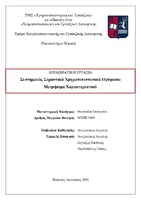Συστημικώς σημαντικά χρηματοπιστωτικά ιδρύματα: μετρήσιμα χαρακτηριστικά
Systemically important financial institutions: measurable characteristics

View/
Keywords
Συστημική σημαντικότητα ; Προσδιοριστικοί παράγοντες ; G-SIB ; FSB ; BCBS ; HLA ; Buckets ; Κεφαλαιακή επάρκεια ; Probit ; Ordered probitAbstract
The present dissertation investigates Systemically Important Financial Institutions (SIFIs) and intends to identify measurable characteristics that make an institution important for the functioning of the global system. The study begins with a description of the ranking G-SIBs method, as developed by BCBS (2013). As this methodology consists of a quantitative approach and a qualitative one (supervisory judgment), this study performs the quantitative analysis using data published by BCBS for the period 2013-2018. By comparing the results with the published GSIBs’ lists, the author can gain some insights about the extent of the supervisory judgment in the bucket allocation. The impact of the cap’s introduction on the substitutability category (one of the indicators of the quantitative approach) is also assessed. The second part of the research examines whether other factors explain the likelihood of an institution being characterized as G-SIB (through a simple Probit model) and/or the probability of being of zero, medium, or high systemic importance (through an Ordered Probit model). To the best of the author’s knowledge, the present study is the only one that has analyzed Οrdered Probit models on G-SIBs topics. As far as the results are concerned, the simple Probit models do not present clear findings. Unlike, the Ordered Probit model approach proposes leverage and the combination of leverage and NPLs to total loans as additional factors of ranking institutions as G-SIBs.


